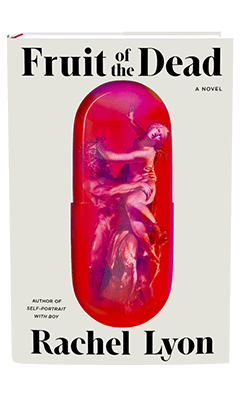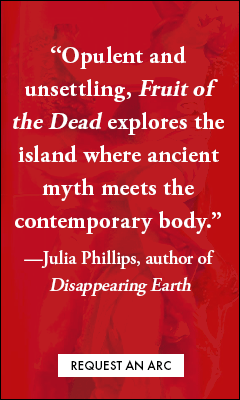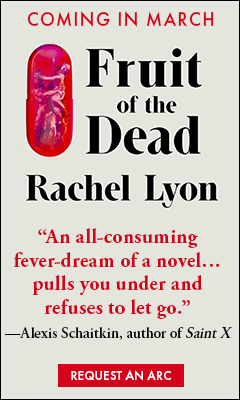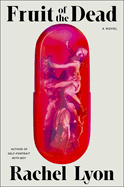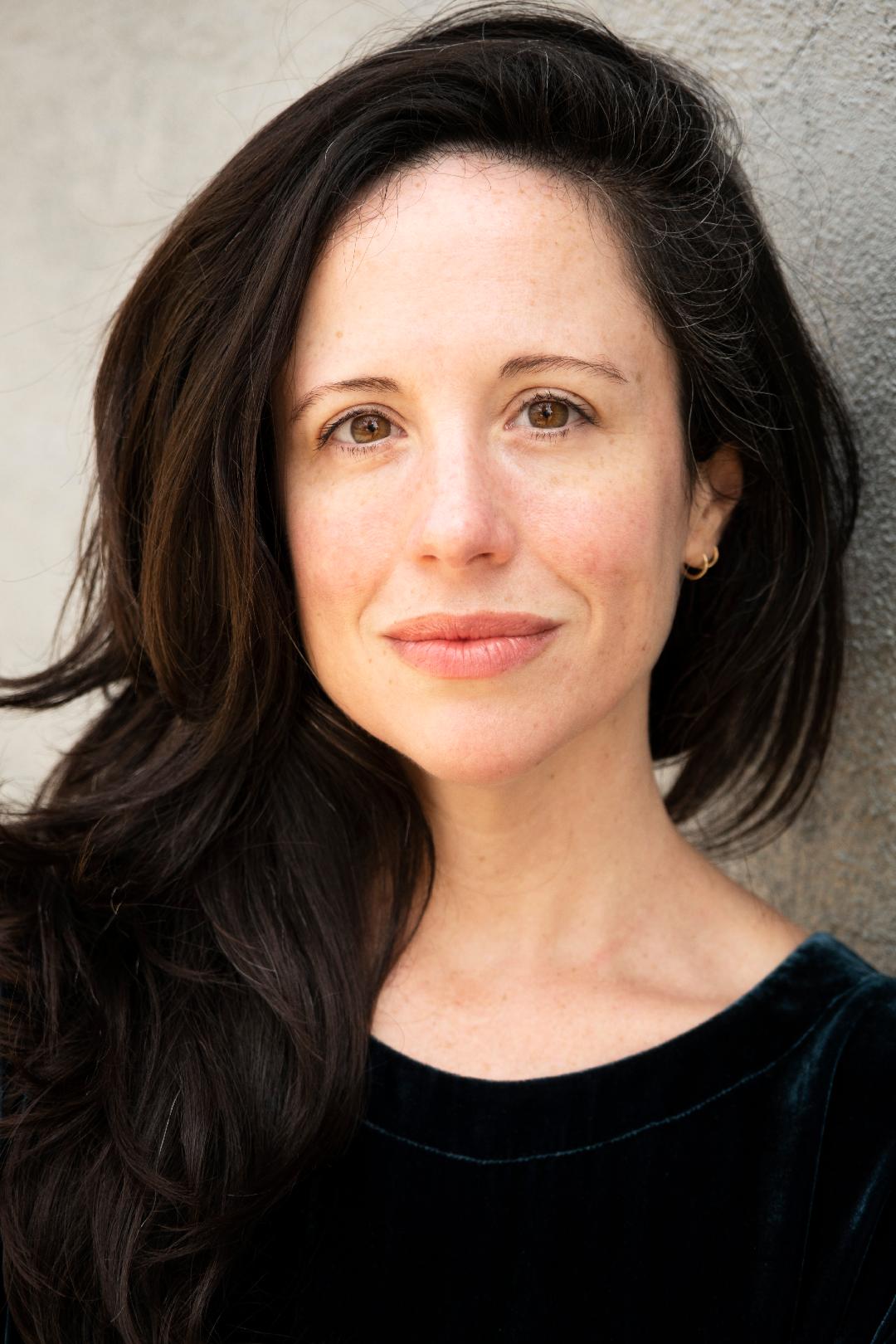Fruit of the Dead
by Rachel Lyon
Rachel Lyon's second novel, Fruit of the Dead, is a lushly detailed, mesmerizing retelling of the ancient Greek myth of Demeter and Persephone, set in modern times. This version retains original themes and subject matter, including power struggles, sexual assault, and cycles of growth and decay, while adding fresh commentary on addiction, class dynamics, and late-stage capitalism. Readers absolutely do not need familiarity with the myth to enjoy the novel, but such familiarity will be amply rewarded by Lyon's subtle, clever references. The result is smart, disturbing, rich with opulent detail, and harrowing (there are several scenes of sexual assault).
The figure of Demeter, goddess of the harvest, appears as Emer Ansel, who runs an agricultural NGO. "We design, provide the seeds, outsource growth to farmers, and export to the hungry in Yemen, Syria, South Sudan, etcetera." She is a woman of lofty principles but has sunk perhaps too comfortably into her professional role; a colleague accuses her of wearing "white savior drag." Demeter had a beautiful daughter named Persephone, fathered by Zeus (god of the sky, king of the gods); Emer is single mother to Cory, who's just turned 18, a wayward teen who has been accepted to zero colleges. Mother and daughter are at serious odds.
To escape the Manhattan apartment they share and forestall an uncertain future, Cory takes a job at her long-beloved summer camp, River Rocks. At a vulnerable moment (among other things, she is high), while caring for Spenser Picazo, a sensitive boy she's befriended who's also the summer's youngest camper, she first encounters Spenser's father. Rolo Picazo--the reimagined character of Hades, god of the underworld--is a self-made, superstar executive of a Fortune 500 pharmaceutical company. He has made his significant fortune on painkillers and now faces congressional hearings for his role in a pattern of destructive addictions.
Cory finds Rolo compelling, intimidating, by turns magnetic and repulsive. He is a massive man with a forceful personality. "His gaze is hard and hungry. It could consume her, she thinks, if she let it." She finds herself spirited away in "a licorice melt of a Cabriolet," accompanied by seven-year-old Spenser and his younger sister, Fern, figuring, "what killer would bring his kids along for the ride?" Rolo has her sign an NDA and transports her to a private island with no cell or wifi service, to serve as new nanny to his two young children. Cory is isolated, insecure. Rolo offers a lavish, seductive lifestyle, and literal intoxication. Emer descends into a wild panic over the disappearance of her barely-of-legal-age daughter, as Cory descends into the pleasurable fuzz of the ruby-colored pills Rolo provides.
Among Fruit of the Dead's themes is the specter of hazards faced by women and girls. Banishing frightening thoughts, Cory reminds herself dismissively, "occasional visits by violence are part of the cost of growing up female." Rolo acts as if anything he desires is his for the taking: by charisma, by money, by force. His threat is looming and omnipresent, beyond its embodiment in one character. While these power struggles are central, Lyon excels at creating complex characters: Spenser and Fern are especially charming, well-rounded children.
In one of Lyon's inspired storytelling choices, chapters alternate between the perspectives of Cory (in close third person) and Emer (first person), so that readers see Cory receive a text from her mother that she interprets as malicious, and later watch Emer send it with hopes of loving inspiration. These quietly tragic misunderstandings abound. Cory has moments of clarity, with misgivings about her disappearance into Rolo's empire of painkillers and dissipation, but she loves her young charges. She mostly thinks her mom is a jerk, and what did Cory have going on, anyway? Emer quickly spirals, beset by calamities at work even as she searches for Cory. "How long have I spent hunting her down, daughter of evasion, daughter of evaporation, daughter of god help me." The "daughter of" refrains lend this retelling an appropriately mythic tone. "Daughter of goofing, daughter of grief,..." "daughter of splendor, daughter of heartbreak, daughter of elusion,..." "daughter of warmth, daughter of sweetness, daughter of mine." And "daughter of unwelcome surprises."
Lyon (Self-Portrait with Boy) expertly leads readers to sympathize with both mother and daughter, even as their perspectives differ. This push/pull echoes the Greek myth's focus on seasonal cycles: Persephone's return to Demeter heralds springtime, her inevitable return to the underworld forcing growth to start over again. The best efforts of the protective mother can only delay the child's foray into danger; every reawakening continues the struggle. Fruit of the Dead offers hope, but always with a seed of foreboding.
This compulsively enthralling novel recasts an ancient myth in familiar times to great effect. Disquieting, propulsive, wise, and frightening, Lyon's imaginative second novel is hard to put down and harder to forget. --Julia Kastner



